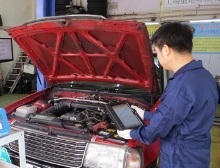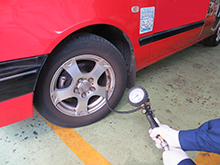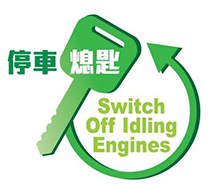Greener Transportation
Having your own car may be very convenient, but it comes to a greater price than petrol cost. Here you can learn about the impact of your vehicle on the environment, and pick up some green tips on travelling.
Transport and the Environment
Most of the vehicles are running on fossil fuel, e.g. petrol, diesel or gas, which is non-renewable and will be exhausted eventually. Fuel combustion also emits nitrogen oxides and suspended particulates, which cause air pollution. These air pollutants are trapped by crowded tall buildings in the urban areas of Hong Kong under the light wind, which worsen the roadside air quality. But all we have to do is change our habits to reduce fuel consumption.
Tips for Greener Travel
Other than the model and price of your vehicle, several points should be aware of when buying, maintaining and fixing your vehicle.
Before You Buy a Vehicle
Environmental protection can begin when you are deciding how to travel.
- The first question to ask is: do you really need a car? The answer might be 'no' if you are surrounded by well-established public transportation system.
- We encourage you to choose electric vehicle if you need to buy a private car.
- If you need to buy a conventional vehicle, choose a car of right capacity – a single person doesn't need a large sized car with a large engine, but under certain circumstances a family might.
- Check the energy label of the car you are considering, or ask about the fuel consumption of the conventional vehicle or the electricity consumption of the electric vehicle. Choose the more energy efficient one.
- If you do decide to buy a car, forming a car pool with your friends or colleagues will help to reduce the pollution that you cause as a group.
Vehicle Maintenance
Regular and proper maintenance of your vehicle can reduce exhaust emission and improve the environment. It can also extend the life span of your vehicle. Using an electric vehicle can even save maintenance cost for gear box, engine oil, exhaust system, etc. It also has no tailpipe emission.
- Keep your car properly tuned: an inefficient car will use more fuel and emit more pollutant, which will harm the environment and cost you more money.

- Maintain correct tyre pressure by inspecting your tyres regularly and inflating them to the pressure recommended by the manufacturer.
While Driving
How you drive can affect the fuel/electricity consumption of your car, so adopting a few habits will save the environment and your money.
- Avoid unnecessary acceleration and deceleration, because it increases fuel/electricity consumption.
- Switch off when idling.
- Close windows when travelling at high speed – this will decrease aerodynamic drag and lower fuel/electricity consumption.
- Avoid carrying unnecessarily things or installing unnecessary car fittings as extra weight will result in fuel/electricity wastage and extra pollution.
- Only use air-conditioning when you have to – flow-through ventilation or open windows at lower speeds can be just as effective without the extra fuel/electricity consumption.
Finding Alternatives
A final way to help protect the environment is to look for alternatives.
- Planning your route ahead of time will help you find easier ways around traffic congestion – you will save time during your journey and reduce fuel/electricity consumption.
- Use public transportation as often as possible – the wide availability of trains, buses, minibuses and ferries in Hong Kong means that most areas can be reached without much expense.

